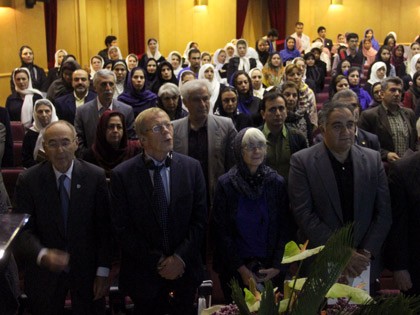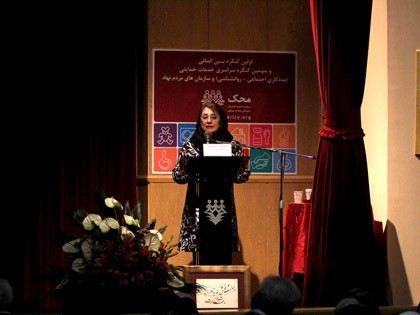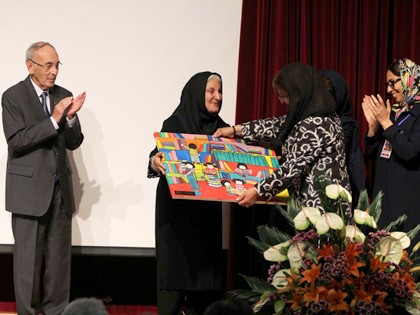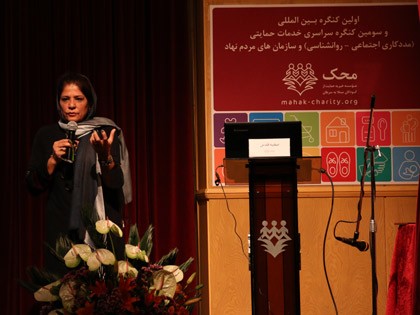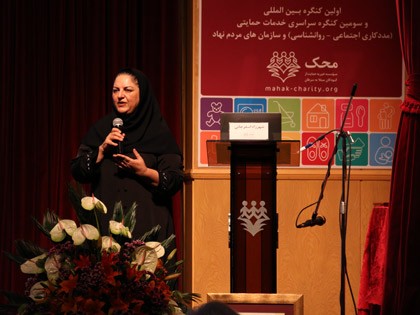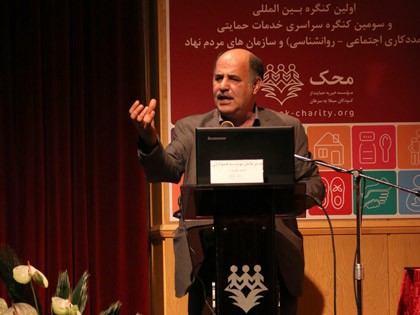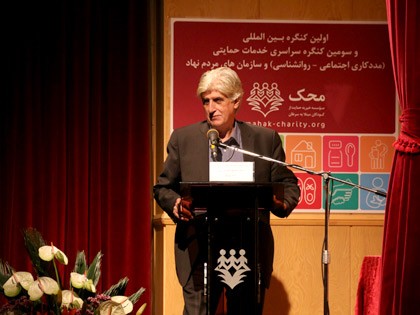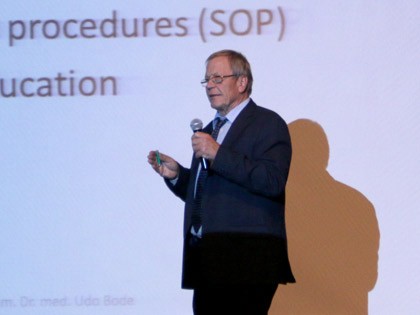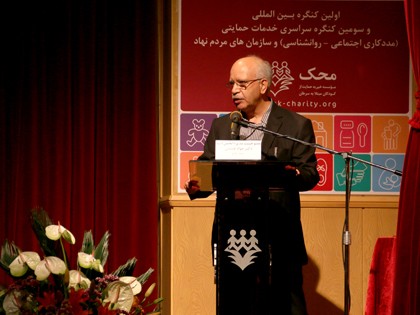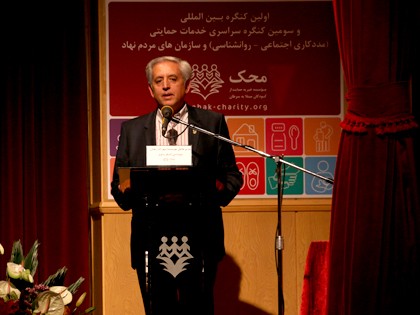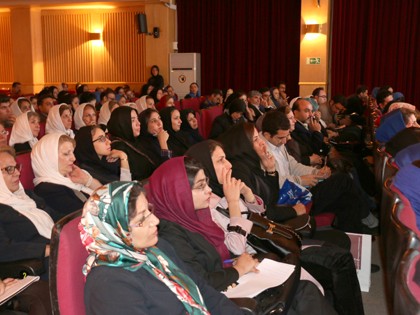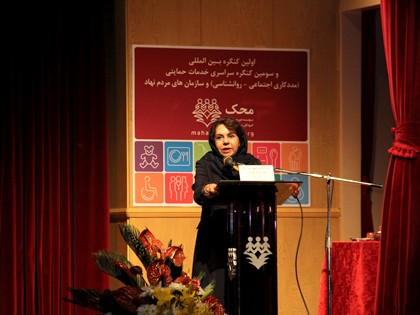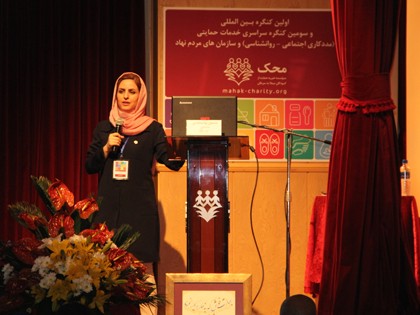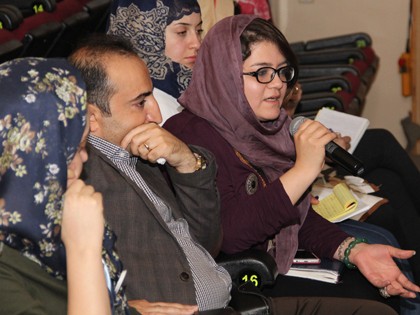
The 1st International Congress on Support Services Was Held at MAHAK
- 9 April 22
- 568 revirew
- 0 comment
The 1st International and the 3rd National Congress on SupportServices and NGOs focusing on psychological-social work interventions was held at MAHAK on 29-30 October 2015.
This international congress was with the presence of active community-based orgnizations’ managers, social workers, psychologists, psycho-oncologists, specialists, university professors, researchers, students and those who are interested in the subject of ‘supporting services’.
MAHAK consistently strives to have a proactive role in organizing national and international conferences, workshops, and congresses in the field of cancer to share its knowledge, achievements and experiences in the areas of research and treatment of all cancer types affecting children.
The Founder of MAHAK: No child with cancer is ever refused treatment due to insufficient financial means
At the beginning of this congress, Saideh Ghods, the founder of MAHAK, with a tribute of respect to the civil society representatives present at the congress, said: “All the active people in community-based organizations and NGOs who are gathered here today at MAHAK, know that hosting such a high level congress was a dream for the people active in community-based organizations. But today, we made this dream come true with the help of willingness, effort, perseverance and responsibility; and we are witnessing the growth and progress of civil society capacities in overcoming the social problems. This outcome is obtained from the fact that at some point, people realized that, presence of the obstacle is not an excuse to leave and neglect the problems. In all the civilized societies around the world, the government is not the only one who is responsible for solving the problems and addressing the issues; and people also have quite a significant role in this regard. Today, we are witnessing the progress in increasing the number of people who are participating in resolving the society-related problems, despite the insecurity in our region. The pride and glory of community-based organizations is a sign of this progress. With the hope that day after day, alongside our responsibilities in our personal life, we also accept responsibilities in our social life.”
Saideh Ghods by pointing out that MAHAK has supported the children suffering from cancer during 24 years by relying on social participations, said: “with a tribute of respect and appreciation to all the benefactors, because of their participation, trust and knowledge that it is possible for MAHAK to say today, MAHAK believes that no child with cancer is ever refused treatment due to insufficient financial means. We are hoping for a day that we could achieve this goal in case of all the diseases and social problems.”
A Painting by MAHAK Children for Prof. Tooran Mirhadi to Commemorate her Valuable Efforts
Prof. Tooran Mirhadi was one of the speakers that MAHAK was willing to benefit from her knowledge and experiences at this international congress on supporting services; but Unfortunately, Prof. Tooran Mirhadi, the professor of children literatures, writer and specialist in the field of education and training who is one of the greatest current individuals in Iran, was not able to participate at this congress due to her health conditions. MAHAK presented one of its most precious property that was a painting made by children suffering from cancer, to her representative Ms. Nooshafarin Ansari. Prof. Tooran Mirhadi has done many valuable activities in the field of education, children culture and literatures. MAHAK as an organization with particular attention to quality of the life of children pays tribute to Prof. Tooran Mirhadi for her treasured efforts.
A Tribute of Respect to Those Who Overcome Big Sorrows by Accomplishing Great Goals
Prof. Nooshafarin Ansari, writer and scholar on librarianship and communication and the secretary of children’s book council who participated on behalf of Prof. Tooran Mirhadi at this congress, stated: “I am here on behalf of one of the most impressive women of our time and I am honored that I’m standing alongside the great individuals who care about their society. Prof. Tooran Mirhadi has patiently overcome many sorrows and problems during the 88 years of her life, believing that one can overcome the big sorrows by accomplishing great goals and the people who think of improving themselves and their society in difficult ways deserve respect and appreciation.
The Manager of MAHAK’s Support Services: We are there to minimize the divide between the medical staff, patients and their families for comprehensive services
The Manager of MAHAK’s Support Services presented a brief report on the structure and activities of MAHAK’s supporting services and explained the three major categories of services delivered to children suffering from cancer including social care, psychological and accommodation services and said: “A child with cancer and the family face many problems before, during and after the treatment such as stress, feeling guilt, anger, anxiety, social and economical pressures, instability and inconsistency between body and mind. At this point, MAHAK support services dept. tries to recognize and resolve the created crisis which can collapse the basis of the family, by carefully and professionally distinguishing the child and the family’s problems. Support services create specific solutions for each and every crisis. In this regard, supporting services act as a bridge between the medical staff, patients and its family; we try to switch the idea of looking at a patient just to fix the physical condition, into fixing all physical, psychological, and social problems caused by cancer.”
Dr. Samadi Rad: Empowering, synergy and joint cooperation between NGOs is necessary
Dr. Samadi Rad, a social work professor at Edinburg university of England and a faculty member of Allameh Tabatabaee university, while emphasizing on the importance of MAHAK and its social workers in providing services to children with cancer across the country, noted that the presence of MAHAK’s social workers in 32 public and academic hospital across Iran as a valuable achievement in the field of social working. He said: “Today, the necessity of empowering, synergy and joint cooperation between NGOs to provide the most professional level of service to the community can be felt more than before”.
By describing social workers’ unique tasks, he said: “social workers must identify the availability of social resources and their potentials for improving the services when needed. Without a doubt, non-governmental organizations such as MAHAK are one of those resources and social potential.”
Dr. Safieh Ghods: Trauma, one of cancer-stricken children’s main problems
At the beginning she declared the transparency as the most important pillar of MAHAK and then described trauma and said:”Any event that cause human being suffer from a severe crisis to the extent that they fear their survival and causes intellectual and psychological crisis is called trauma.”
She pointed the difference between trauma in children and adults and said:”When you face danger, mind is immediately able to differ between a dangerous or non-dangerous situation. While you are facing danger the first reaction is to run away, fight or stay still. The study of individual neural map experiencing trauma shows the effect on their middle brain and it can be observed in all levels of the individual nervous system. Dr. Ghods explained trauma’s level and its intervention difference and added:”The most important issue in facing the trauma is self-management. For that reason today, strengthening the individual’s physical and psychological abilities are important before surgeries. Since the resources are limited, treatment centers should prioritize their resources.”
Shahrzad Esfarjani: Managers’ foresight is necessary to attract social participation
Shahrzad Esfarjani, an expert administrative coach, writer, speaker, branding and advertising strategist and MAHAK’s CEO’s consultant, started her speech by pointing that the laws regulating non-governmental organizations are the same as the laws regulating business entities. She highlighted the existence of a big gap between organizations and sustainable development, and raised the question of “do the NGOs need coherent communication process?” And the answer was that due to people’s limited time and trust, a coherent communication process is necessary.
Esfarjani also added that “organizations need financial resources in order to function in a steady way. This stability depends on, love, understanding, managers’ foresight, and most importantly patience. Because it must influence all marketing elements. The gap between organizations and sustainable development could be eliminated by the analysis of the position, determination and prioritizing of goals, identifying the target audience, content development, media composition, compilation and evaluation, by the lowest costs and achieving the highest effect. Value creation is not accidental and it requires the highest level of managers’ foresight and its transition to all members of the organization, since the branding starts from within”
The CEO of the Iranian Hemophilia Society: Patients don’t need pity
Ahmad Ghavidel the CEO of the Iranian Hemophilia Society started his speech by paying tribute to Mostafa Ghasemi the late CEO of Kidney Foundation of Iran. Afterwards he thanked the Minister of Health and Medical Education for implementing the healthcare reform and hoped for the promotion of such services. According to his words, such renovations are rooted operating on the basis of a strategic plan. He highlighted the importance of social supports alongside with financial support for patients on long-term treatment. Ghavidel added:”Professional, scientific and logical activities for supporting patients and systematic management of NGOs are today’s priorities.
He also remarked the need to eliminate the feeling of pity from the philanthropic acts of charity referred to the patients’ civil right and said: “patients are not pitiful and they have precise legal right by maintaining which, the patients could be kept away from entering the cycle of poverty. He continued: “the capacity of government, non-governmental organizations, insurance companies and private entities, along with the cultural, sporting, artistic and social potentials could be assist to maintain to the rights of patients.”
He closed his speech by appreciating MAHAK’s visit from the Iranian Hemophilia Society on the occasion of world hemophilia day while a clip of the painting of children with Hemophilia was displayed to deliver their message of love and hope.
The CEO of Behnam Daheshpour Charity Org.: Creation, today’s necessity for NGOs
Leili Rezaei, the CEO of Behnam Daheshpour Charity Organization, reviewed some of this organization’s experiences after expressing her own satisfaction for the presence of various NGOs at MAHAK’s congress.
She highlighted the necessity of creativity in NGOs and said: “Because of the religious believes among Iranians, different NGOs have been established and moved towards specialization. But today NGOs need more creativity. Nowadays, all the NGOs follow similar methods of attracting public participation, such as donation boxes, membership, etc.”
She also talked about human resources in NGOs. She said: “because of the influential role of NGO among the society, the most expert and the most effective members of society should work for non-governmental organizations to leave the most positive effect. She continued her speech by mentioning the necessity of transparency in NGOs. About Behnam Daheshpour she said: “we cannot help all the patients suffering from cancer; so, instead of creating more branches in other cities, we try to support others to establish similar NGOs and we will try our best to help them.”
The Faculty Member of the University of Social Welfare and Rehabilitation Sciences: NGOs are responsible for creating more effective opportunities to improve people’s life
Amir Mahmoud Harirchi, the faculty member and former social support group’s manager of the University of Social Welfare and Rehabilitation Sciences, initiated by emphasizing on the necessity of planning a practical program to develop all aspects of NGOs and said: ”If we don’t know where we should go then we think all paths are correct.”
Harirchi believes that the original nature of the NGO is to improve and complete the services that are under government responsibility. He then pointed to the world developmental indicators and said: ”One of every country’s developmental indicators in the world is the number of active NGOs in that country. 8 years ago we had 6000 registered NGOs in ministry of interior but it has reduced to 2000 NGOs this year and lack of strategic management and long-term planning are the main reasons.:
Explaining the differences between NGOs and social movements, Harirchi said: ”The reason that MAHAK is known to the world is its transparency and strategic management; which makes every single Iranian hopeful.”
At the end Harirchi talked about the importance of research in social activities and added:” NGOs are responsibile to create more effective opportunities to improve people’s life”.
Former Head of Pediatric Hematology-Oncology Division, University of Bonn: Psychosocial care is part of a holistic concept of cancer care
Prof. Dr. Udo Bode, a Hematologist and Pediatric Oncology specialist and former head of Pediatric Hematology-Oncology Division, University of Bonn, started his speech by appreciating the comprehensive services delivered to cancer-stricken children at MAHAK Hospital and emphasizing, “A holistic cancer care concept is our main goal“. He added that according to the researches conducted around USA and Europe, psychosocial care for children with cancer are maintained along with their multimodality treatment protocolls. He said: “cancer treatment requires permanent and multimodality care treatment, and chemotherapy, as the treatment with priority, has various side effects.”
Prof. Bode stated that providing information to the cancer-stricken child and all the family members with comprehensive and clarified information regarding the disease is one of the most significant factors in the treatment process. He added: “Honesty to all people involved (age-dependent) is necessary; and optimism and realism are main motivations during the treatment”. According his words, continuous informative and educational trainings for medical staff along with patients, their family members and friends is essential. He continued: “Without therapy every child with cancer is going to die soon; it only can get better if he/she can receive treatment. Such approach cures 75% of the patients.”
He emphasized the prominent role of trust between the medical team and the desperate family members, and added: “The presence of psychologists and social workers together with the medical staff, close to the child and the family during the treatment is necessary.” He continued by explaining his experiences and said: “The physician should promise to treat each child as if it would be yours, the first information should be done by senior physicians (1hr conversation, written information), the family should receive information about unpredictable course of therapy and being allowed to ask any question regarding the treatment and so forth.”
At the end of his speech, he highlighted the standard level of the psychological and social services at MAHAK and said: “Referring to the stats of the Bon Hospital’s parent support group, the parents are mostly satisfied with the services they receive, even those who have lost their children.”
Cofounder of ICCCPO: Psychosocial support for parents of children with cancer is crucial
Being the cofounder of a local parent initiative in Bonn as well as having a long term experience of NGO management in the roles of board member and the CEO of German national organization of parent initiatives (Deutsche Kinderkrebsstiftung) from 1987 to 2007, are among the significant career achievements of Dr. Gerlind Bode who has been also the Cofounder of International Confederation of Childhood Cancer Parent Organizations (ICCCPO).
Dr. Bode started her speech by introducing the Förderkreis Organization in Germany, an initiative of parents of children with cancer with the aim to help other families in the same situation and said: “We cannot take the disease away – but we can make their life with it a lot easier”. The Förderkreis is member of the national parent organization called ‘Dt. Kinderkrebsstiftung’, that conducts medical research, participates in information exchange and awareness campaigns and also provides the parents of cancer-stricken children with various services such as parent house, psycho-social support, school programs, playroom, kitchen, music therapy, bravery beads and different leisure activities.
She added: “In Förderkreis, a social worker supports each family from the first day
in all necessary aspects, along with a Psycho-oncologist with qualification in family-therapy.” Regarding the bravery beads, she explained that for every procedure the patients get a little pearl which is threaded on a string and makes a long chain demonstrating his history of the treatment.
Emphasizing the fact that the most important help in every supportive center would be the daily contact with the families, Dr. Bode ended her speech by marking MAHAK as an example that is achieving this goal every day.
Associate Director of the NCDs Department and NGOs in Ministry of Health and Medical Education: The connection between NGOs and health system, an inescapable priority
Dr. Mohammad Taghi Cheraghchi Bashi, the associate director of the NCDs department and NGOs in Ministry of Health and Medical Education and the deputy managing director of Gabric Diabetes Education Association, congratulated MAHAK for holding this congress and said: “The connection between NGOs and health system is an inescapable priority.”
Dr. Cheraghchi mentioned that: “in comparison with other countries, the number of NGOs in Iran is very few. Unfortunately, these few NGOs are working separately, which is not efficient. Health is an undeniable right for all of the citizens, and the government is in charge of providing health for the people. Today, governmental and non-governmental organizations are active in the public health related issues.”
He continued: “The government has increased its attention to the NGOs and accordingly the integrity between the NGOs and other public health organizations has been intensified. He also said: “MAHAK is one of the pioneer NGOs and its role in managing and integrating the NGOs and public health organizations is indeed crucial”.
Member of Omid Charity Organization’s Board of Directors: Changing health behaviors requires behavioral change interventions
Javad Khashabi, member of Omid Charity Organization’s Board of Directors, acknowledged the conductors of the congress and introduced Omid Charity Org. he said: “The first step in fighting against cancer is providing the society with enough information about this disease and make them aware of its causes. The next step is trying to change health behavior of the people, which requires intervention, and the role of NGOs in changing the health behavior is very important.”
At the end, Mr. Khashabi remarked the importance of maintaining the dignity of children and their families in advertising materials and criticized the organizations that use inappropriate photos, such as the sickly face of patients, to attract public attention and appreciated MAHAK for preventing the creation of a sense of pity.
Asghar Vosough: Mehraneh charity organization looks up to MAHAK as a good example
Asghar Vosough, the CEO of Mehraneh Charity Organization in Zanjan, initiated by reviewing the relation between MAHAK and Mehraneh and said: “My feeling towards MAHAK has been always like a primary student’s feeling to his teacher”.
As an introduction to Mehraneh Charity, he continued: ”I am honored to say that we are coming from a small town with 400,000 populations in which 50,000 of them are our volunteers and all cancer stricken children in our town have a file in our charity. As a result of people’s trust towards Mehraneh, we receive $1 million as a monthly donation and upon raising 22 billion Rials contributed by people living in Zanjan, we could open Mehraneh Specialized radiotherapy clinic”.
By highlighling to Mehraneh’s residential center services for patients and their families, Vosough asked all institutions active in the field of cancer to work together and have more effective steps towards helping patients.
Second Day – Workshops
Effective communication, different communication, 17 pillars of team work and defense mechanism workshop was held on the second day of this congress.
Three of the the main workshops were completed by:
- . Shirin Sedighnezhad – Manager of MAHAK’s local offices department: MAHAK’s goal is to expand services all around the country
- . Saba Kamkar- Manager of MAHAK’s public and international relations department: Comprehensive and effective communication is MAHAK’s commitment to its stakeholders
- . Neda Nedaee – psychological expert at MAHAK: Having communication skills is the main condition to meet the needs of organizations
MAHAK, as a pioneer in making available scientific and technical methods pertaining to children with cancer in Iran, is striving to implement these types of events to bring further awareness and scientific information. We express our preparedness and determination to play an active role toward the fruition of our common dream of eradicating cancer and hope that one day all cancer-stricken children receive the global support and assistance required for a life of health, dignity and fulfillment.
